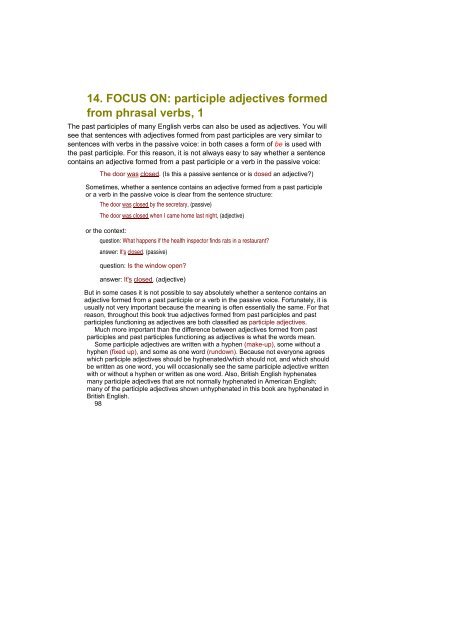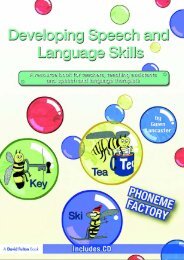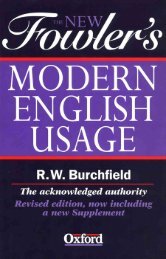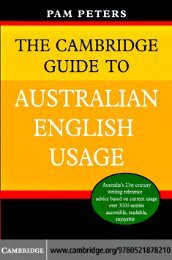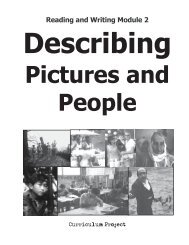- Page 1 and 2:
THE ULTIMATE PHRASAL VERB BOOK Cont
- Page 3 and 4:
give away..........................
- Page 5 and 6:
TABLE OF CONTENTS To the Teacher /
- Page 7 and 8:
THE ULTIMATE PHRASAL VERB BOOK Stud
- Page 9 and 10:
1. FOCUS ON: separable and nonsepar
- Page 11 and 12:
THE ULTIMATE PHRASAL VERB BOOK Did
- Page 13 and 14:
After he found out the FBI was look
- Page 15 and 16:
3. She put on. (her slippers, them)
- Page 17 and 18:
used to doze off while driving, but
- Page 19 and 20:
Infinitive present tense -ing form
- Page 21 and 22:
11. Don't get close to the fire. It
- Page 23 and 24:
3. FOCUS ON: three-word phrasal ver
- Page 25 and 26:
was furious about the way he talked
- Page 27 and 28:
4. FOCUS ON: present and past conti
- Page 29 and 30:
Infinitive plan for present tense -
- Page 31 and 32:
15. The guy in the seafood store __
- Page 33 and 34:
4. These instructions don't make an
- Page 35 and 36:
The police broke the door down and
- Page 37 and 38:
The kids got a swing set for Christ
- Page 39 and 40:
2. They burned down, (the old barn,
- Page 41 and 42:
6. I'm sorry I can't agree with you
- Page 43 and 44:
Infinitive present tense -ing form
- Page 45 and 46:
EXERCISE 6c, Review — Complete th
- Page 47 and 48:
Infinitive hold up present tense -i
- Page 49 and 50:
3. run over p.v. When liquid in a c
- Page 51 and 52:
3. take... in p.v. When you allow p
- Page 53 and 54:
3. Don't let out. (the dog, it) )
- Page 55 and 56: EXERCISE 7d, Review — Complete th
- Page 57 and 58: Infinitive fall over 2. burn out p.
- Page 59 and 60: They tore so many old buildings dow
- Page 61 and 62: EXERCISE 8c — Write answers to th
- Page 63 and 64: 15. Karen loves to ski. In fact, sh
- Page 65 and 66: Infinitive present tense -ing form
- Page 67 and 68: energy, confidence, courage, and so
- Page 69 and 70: 2. After my accident, I had to give
- Page 71 and 72: 10. Everyone in town knows that Jak
- Page 73 and 74: 2. go ahead p.v. When you tell peop
- Page 75 and 76: 3. lay off p.v. When you lay off so
- Page 77 and 78: 6. The teacher prepared a _________
- Page 79 and 80: 15. All is doing Omar's job while O
- Page 81 and 82: Infinitive present tense -ing form
- Page 83 and 84: cutoff n. The time when something,
- Page 85 and 86: 2. take ...out (of) p.v. When you r
- Page 87 and 88: Maria worked out bow much paint we
- Page 89 and 90: 26. The baseball manager decided to
- Page 91 and 92: 11. At the edge of the continental
- Page 93 and 94: 10. I was so stuffed from that huge
- Page 95 and 96: Mother's Day is coming up, so I nee
- Page 97 and 98: Remember to sign out your lab equip
- Page 99 and 100: EXERCISE 12d, Review — Complete t
- Page 101 and 102: closed off part.adj. An area that y
- Page 103 and 104: Infinitive present tense -ing form
- Page 105: 7. The EPA tracked down. (the pollu
- Page 110 and 111: Infinitive present tense -ing form
- Page 112 and 113: overslept because I forgot to wind
- Page 114 and 115: _____ _____. The sun quickly dries
- Page 116 and 117: EXERCISE 14e, Review — Complete t
- Page 118 and 119: These contractions are used with be
- Page 120 and 121: am going to fix this place up and t
- Page 122 and 123: Infinitive tell on present tense -i
- Page 124 and 125: 8. If there's an earthquake, no one
- Page 126 and 127: 14. Mrs. Nash isn't in the office a
- Page 128 and 129: 2. count on p.v. When you rely on s
- Page 130 and 131: Is he capable of murder? Well, I wo
- Page 132 and 133: 7. Paul couldn't continue his caree
- Page 134 and 135: 2. Sally loves all outdoor sports,
- Page 136 and 137: etween the two particles sounds acc
- Page 138 and 139: Infinitive present tense -ing form
- Page 140 and 141: 4. (eventually) Sally will grow out
- Page 142 and 143: 1. I don't know when the train to B
- Page 144 and 145: When the condition in the if clause
- Page 146 and 147: Infinitive present tense -ing form
- Page 148 and 149: 10. Mother was the last one to ____
- Page 150 and 151: EXERCISE 18d, Review — Complete t
- Page 152 and 153: Infinitive present tense -ing form
- Page 154 and 155: 2. pull... over p.v. When you are d
- Page 156 and 157:
19. This coffee is too hot. I can't
- Page 158 and 159:
3. The warden wasn't just upset wit
- Page 160 and 161:
1. go around p.v. When people or th
- Page 162 and 163:
asked her to be quiet, but she went
- Page 164 and 165:
5. Where are you going? Why don't y
- Page 166 and 167:
and previous sections followed by t
- Page 168 and 169:
13. This rug is wet; let's take it
- Page 170 and 171:
Infinitive present tense -ing form
- Page 172 and 173:
9. The two countries have a history
- Page 174 and 175:
10. Sally said she would come to my
- Page 177 and 178:
Infinitive burn up present tense -i
- Page 179 and 180:
plug up paid up part.adj. After you
- Page 181 and 182:
6. Wipe up right now! (that water,
- Page 183 and 184:
23. FOCUS ON: two-word phrasal verb
- Page 185 and 186:
I'm tired of that jerk. I'm going t
- Page 187 and 188:
My son asked me to make up a story
- Page 189 and 190:
5. ________ ________ of the water
- Page 191 and 192:
8. Most of the Democrats will vote
- Page 193 and 194:
It's been raining for an hour! It's
- Page 195 and 196:
Infinitive stop over present tense
- Page 197 and 198:
EXERCISE 24d — Write answers to t
- Page 199 and 200:
2. Drugs are getting to be a big pr
- Page 201 and 202:
You have to make up the test. You'v
- Page 203 and 204:
Plan ahead — you don't want any p
- Page 205 and 206:
1. It's freezing outside — make s
- Page 207 and 208:
that person. When a man and woman r
- Page 209 and 210:
Infinitive_________________________
- Page 211 and 212:
5. The sergeant ________ ________ t
- Page 213 and 214:
6. In Question 5, what is this acti
- Page 215 and 216:
He washed the dirt off. (The dirt w
- Page 217 and 218:
washed off part.adj. After you wash
- Page 219 and 220:
3. Please dry off. (the dishes, the
- Page 221 and 222:
3. It rained for forty days and for
- Page 223 and 224:
eakup n. When two people end a roma
- Page 225 and 226:
Everything was perfect until you me
- Page 227 and 228:
5. Susie always messes up. (the bat
- Page 229 and 230:
29. FOCUS ON: phrasal verbs and mig
- Page 231 and 232:
Infinitive present tense -ing form
- Page 233 and 234:
5. In Question 4, how would you des
- Page 235 and 236:
6. Andrew Carnegie was a very rich
- Page 237 and 238:
locked out part.adj. When people ca
- Page 239 and 240:
After you take the laundry out of t
- Page 241 and 242:
2. Jim Iocked out. (his wife, her)
- Page 243 and 244:
13. In Question 12, how would you d
- Page 245 and 246:
10. You won't be able to ________ t
- Page 247 and 248:
Infinitive present tense -ing form
- Page 249 and 250:
12. I had to take a taxi to work ye
- Page 251 and 252:
8. My dentist said I should _______
- Page 253 and 254:
cleaned out part.adj. After you cle
- Page 255 and 256:
Infinitive empty out present tense
- Page 257 and 258:
I hate this job, but I need the mon
- Page 259 and 260:
6. As expected, the leader of the o
- Page 261 and 262:
EXERCISE 32e, Review — Complete t
- Page 264 and 265:
Infinitive present tense -ing form
- Page 266 and 267:
Infinitive present tense -ing form
- Page 268 and 269:
4. If you don't start working harde
- Page 270 and 271:
34. FOCUS ON: pronunciation of two-
- Page 272 and 273:
2. stand for p.v. When people or ob
- Page 274 and 275:
7. take ... back (to) p.v. When som
- Page 276 and 277:
8. Carlos came to my house and stay
- Page 278 and 279:
Infinitive present tense -ing form
- Page 280 and 281:
Living with this disease is not eas
- Page 282 and 283:
3. Sally and her sister's husband g
- Page 284 and 285:
15. Bill was talking about moving t
- Page 286 and 287:
Infinitive lay down 4. go down p.v.
- Page 288 and 289:
Maybe I need to go to the doctor; I
- Page 290 and 291:
2. The mechanic laid down. (her too
- Page 292 and 293:
12. No one wants to sit with me in
- Page 294 and 295:
and continue as before without lett
- Page 296 and 297:
leftover part.adj. Something that i
- Page 298 and 299:
5.1 set the thermostat so that the
- Page 300 and 301:
15. The head of the health departme
- Page 302 and 303:
11. ________ ________ that jerk for
- Page 304 and 305:
Will you please keep it down; I'm t
- Page 306 and 307:
5. keep... up p.v. When people or t
- Page 308 and 309:
13. My son is eighteen, so I can't
- Page 310 and 311:
Recall from Section 28 that phrasal
- Page 312 and 313:
When the weather is right,you can p
- Page 314 and 315:
2. take... over p.v. When people, g
- Page 316 and 317:
21. Smoking is a bad habit that I _
- Page 318 and 319:
8. Someone ought to draw a line thr
- Page 320 and 321:
40. FOCUS ON: gerund phrasal verbs
- Page 322 and 323:
comeback n. When a fashion or fad b
- Page 324 and 325:
5. Linda ________ ________ from the
- Page 326 and 327:
5._________________________________
- Page 328 and 329:
Infinitive present tense -ing form
- Page 330 and 331:
The store's closing in a few minute
- Page 332 and 333:
9. I was late for class, so I waite
- Page 334 and 335:
EXERCISE 41 d, Review — Complete
- Page 336 and 337:
We left three weeks ago, and we did
- Page 338 and 339:
3. get... inlinto p.v. When you get
- Page 340 and 341:
3. get over p.v. When something hap
- Page 342 and 343:
27. Timmy's mother said,"Who said y
- Page 344 and 345:
10. Nancy was in the shower when I
- Page 346 and 347:
Infinitive present tense -ing form
- Page 348 and 349:
EXERCISE 43a — Complete the sente
- Page 350 and 351:
EXERCISE 43d — Write answers to t
- Page 352 and 353:
1. If you're hungry, there's some _
- Page 354 and 355:
44. FOCUS ON: participle adjectives
- Page 356 and 357:
Infinitive David drank too much and
- Page 358 and 359:
3. Erik promised me that he would c
- Page 360 and 361:
7. Scratching my brother's new car
- Page 362 and 363:
45. FOCUS ON: phrasal verbs with th
- Page 364 and 365:
turnoff n. Something that offends y
- Page 366 and 367:
4. turn out (for) p.v. When people
- Page 368 and 369:
5. Jake thought Hank was his best f
- Page 370 and 371:
12. Nicole didn't change the contro
- Page 372 and 373:
46. FOCUS ON: pronunciation of phra
- Page 374 and 375:
talk out of My father didn't want t
- Page 377 and 378:
EXERCISE 46d, Review — Complete t
- Page 379 and 380:
47. FOCUS ON: particles used withou
- Page 381 and 382:
2. cut back (on) p.v. When you cut
- Page 383 and 384:
4. put... inlinto p.v. When you put
- Page 385 and 386:
21. I bought a new bed for Susie, s
- Page 387 and 388:
8. My father-in-law was ________ __
- Page 389 and 390:
Tom's new house is fabulous! It rea
- Page 391 and 392:
2. throw... out (of) p.v. When you
- Page 393 and 394:
EXERCISE 48c — Write answers to t
- Page 395 and 396:
8. The police acted on a tip that t
- Page 397 and 398:
Get to work has two meanings, simil
- Page 399 and 400:
2. get on p.v. When you mount an an
- Page 401 and 402:
putting it in the wastebasket, tras
- Page 403 and 404:
11. Bill said that he couldn't wait
- Page 405 and 406:
50. FOCUS ON: Keep at it! I hope th
- Page 407 and 408:
1. turn ... around p.v. When you tu
- Page 409 and 410:
7. Bill's baseball team was way beh
- Page 411 and 412:
1. Trying to take care of my family
- Page 413 and 414:
4. Thanks for inviting me to go sai
- Page 415 and 416:
1a 1. took off 2. took off 3. put..
- Page 417 and 418:
9. put... to 10. pile up 11. handed
- Page 419 and 420:
399
- Page 421 and 422:
3. I dropped off Prank at the airpo
- Page 424 and 425:
4. light up 5. tracked ...down 6. l
- Page 426 and 427:
17d 1. find out 2. get along 3. go
- Page 428 and 429:
402 2. I looked around. 3. They set
- Page 430 and 431:
25a 1. hurry up 2. settle for 3. ha
- Page 432 and 433:
3. You ran across your college room
- Page 435 and 436:
33d 1. rule ...out 2. put off 3. pu
- Page 437 and 438:
9. You hope she can keep it up. 10.
- Page 439 and 440:
6. blew out 7. shut...up 8. stop of
- Page 441 and 442:
21. move ...out 22. put in 23. come
- Page 443 and 444:
409
- Page 445 and 446:
come from figure out give back look
- Page 447:
Page 19: [1] Comment [S10] Slava n.


